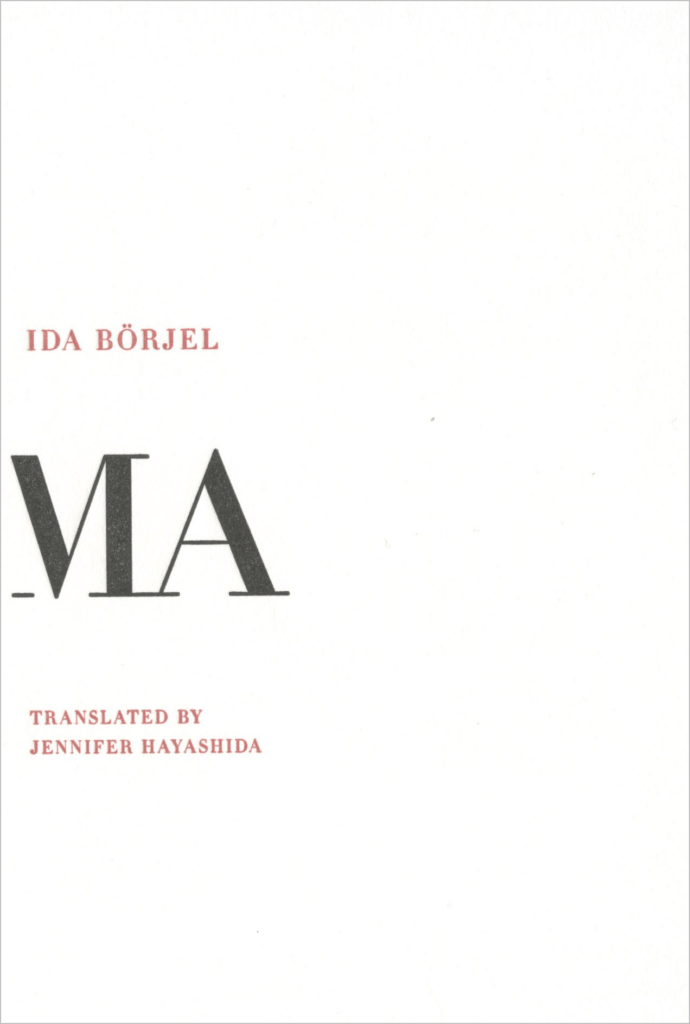
Swedish Ida Börjel, like the Scandinavian author Inger Christensen, models her collection on abecedary for her striking 2014 volume. Ma, in its 2023 first English edition, however, resembles the Danish author’s compendium only in its structural format. Unlike Christensen, Börjel’s work is a dark, suffering, and probing account that frequently draws on war, deprivation, and psychological trauma, for its subject matter. It suggests a disturbed individual who repeatedly picks at a scab.
Börjel’s entries for the first few letters of the alphabet corroborate this description. Under “A,” for example, we learn that Ma, once broken into pieces, becomes anima, mother animal and mother tree. In right aligned text, Börjel begins her alphabetical allusions with unnumbered pages and frequently ends her alpha series with an italicized word. Researching these end words, we discover useful historic material that gives background information for an entire entry of a given letter of the alphabet.
In “B”, Börjel brings us orphanages, soil, compliance with rules, the blind spot through which Mother arrives night after night. We are in Bulgaria but we also meet broken words, bribes, beaten military dogs, and Budapest’s national theater, now silenced. Someone has made an escape to Greece and we follow along through tear gas, the loss of electricity, and ‘belligerent’ warfare. The “B” passage alludes to many types of torment, warfare, cattle cars in Kazakhstan, mistreatment of girls in Kyrgyzstan, and movie clips of Bergen-Belsen, etc.
In “C” we encounter the cyborg, cycles of “unholy alliances,” the Syntagma (which may refer to linguistic devices, or to sensorsused to tag brain synapses), the weighted history of the Friedrichstrasse Metro Station of East Berlin, and a Rumanian city that boasts the largest racetrack in the country. We recognize the author’s type of fragmented allusions, rarely rendered in full sentences. With limited punctuation use, it is often only end-line breaks that suggest possible caesurae or lend themselves to phrase groupings. Another style conceit is the author’s use of the simple, single word “was,” to mean “this also existed, or this also must be considered.” Fragments from “G” will demonstrate:
genealogies were, grooves
groans; mumbled shut was; ghetto
ghetto hostages; street guerillas were
no one shared anymore, everyone
had started to eat and chew on the sly
tactical gutting of memories
of home; the blackened, charred
village was, in the ravaged forest
In the approximate mid-point of the book, at the letter “M,” the right alignment on the page shifts to left aligned. “M” appears as a possible tribute to “Ma” albeit a negative one, and begins with these lines:
Ma—
I see
through the open gate
I breach
no it is impossible to write
it cannot be written
I cannot
I cannot
it should not be possible to write
how can I be where the poem is
death
When this despairing segment proceeds to “N,” the print presentation returns to right-alignment. “N” ends with its italicized word Alhena, which follows these phrases: “by the lake upon which hundreds / of horse heads were seen resting as though / severed by a sharp guillotine blade / and noa-names, nepotism …” (Alhena refers to the third brightest object in the Gemini constellation.)
Some alpha-segments surprise me. If I expect to find oikonomia at “O,” instead I find the author’s linguistic arrows pointed toward opium, odium, ovula, omnipotence, and the omega-point. Her use of “Ilinx” presents as a kind of justification for violent laughter, where Ilinx can also be a form of play, causing disorientation. By “O,” the idea of disorientation is no surprise.
But what do we make of this eccentric and enigmatic volume so rich in its oft-devastating imagery, pursuant to our careful reading? The text belongs irrevocably to our fragmented, irregular, and warring times. When we encounter in “X” faceless flocks and parapraxes about uncertainty and amnesia, Xanax assumes a place of prominence, sometimes standing in counterpoint to amnesia. Not without difficulty do we understand this volume as a necessary document to the eugenics practices post-world-war readers have witnessed on the world’s stage.
What price must the author pay for her unusual echolalia? And what kind of life was offered to her? Or denied her? Perhaps Mnemosyne is the only way forward toward resolution. Börjel presents her concluding words: “how endurance / endures when / suicide among survivors / of the camps / when once / irreconcilable with life when, then / the dam, the fish / metallic light on leaves / folded words to a close aorta”
With that significant end word, Börjel seems to offer the very lifeblood of her artistry in this strained and unforgettable volume. Though difficult, I can’t deny its place as an essential volume for our times. Is its chief purpose to make 21st century readers feel shame? anger? disturbance? All these and more, I believe. But it’s not a book to cozy up to, expecting a sweet afternoon cup of tea.
Ma, by Ida Börjel. Tranlated by Jennifer Hayashida. Brooklyn, New York: Ugly Duckling Presse, June 2023. 336 pages. $20.00, paper.
Carole Mertz, poet and essayist, has published recent reviews with Full Stop, River Teeth, and The Ekphrastic Review. She is Poetry Editor with The Ocotillo Review and Book Review Editor at Dreamers Creative Writing. More: carolemertz.com.
Check out HFR’s book catalog, publicity list, submission manager, and buy merch from our Spring store. Follow us on Instagram and YouTube. Disclosure: HFR is an affiliate of Bookshop.org and we will earn a commission if you click through and make a purchase. Sales from Bookshop.org help support independent bookstores and small presses.

Leave a comment